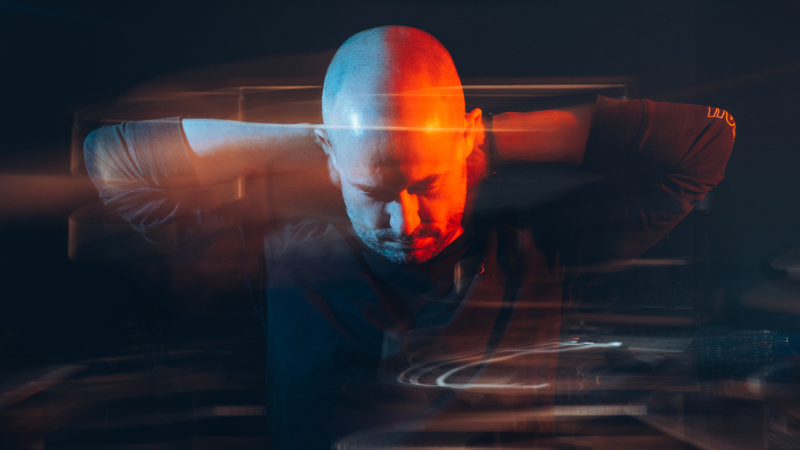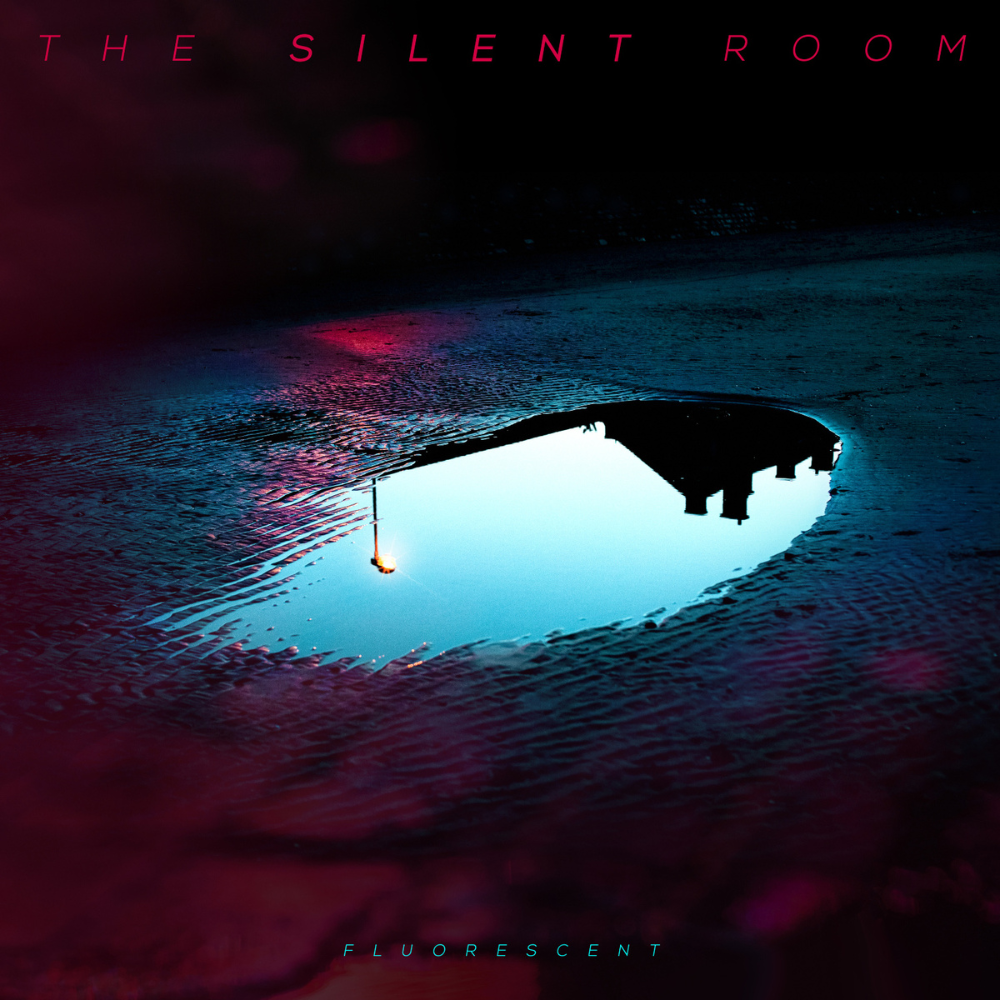Image credit: Erica Hawkins
EP RELEASE DATE: 18th of October 2024
LABEL: Meddle
SoundCloud: The Silent Room – “Veins”
Stream/Download: Fluorescent EP – Bandcamp
“The Silent Room shares his new irresistibly upbeat, lush dance anthem, ‘Veins,’ following the release of his debut single ‘You’ll Never Know.’ This is the focus track of Fluorescent, a dreamy body of work and a promising first project from The Silent Room.” – METAL Magazine
“Evoking chimerical film soundtracks and the nocturnal synthwork of artists like M83, TOTO, and Cannons, the intricately-rendered ‘You’ll Never Know’ is an arpeggiated escapade flitting between feelings of remembrance and catharsis.” – CLASH Magazine
The Silent Room, the solo moniker of UK composer and keyboard player Tim Oliver, released his debut EP, Fluorescent, on October 18th, 2024 via his Meddle imprint.
Fluorescent showcases collaborations with Jess Greenfield (Noel Gallagher’s High Flying Birds), Owen Parker (Robbie Williams), Sam Wilcock (Paul Young) and Iain Hornal (ELO) and has already garnered support from tastemaker publications CLASH and METAL Magazine. Prior to spearheading this solo project, Tim Oliver performed as a keyboard player around the world with a range of artists, including Neneh Cherry and Boy George, gracing stages at the likes of Glastonbury. He also performed with Lady Gaga on the hit BBC TV show Friday Night with Jonathan Ross. As a TV composer, he has scored shows including the BBC Landmark Series Jungle Atlantis and several episodes of BBC’s prestigious factual series Horizon.
Based in Hertfordshire, UK, Tim came from a musical background. His mother was a concert pianist and singer with a touring Scottish trio, while Tim learned piano and violin at school. His career began as a piano teacher, while simultaneously building his career as a session musician. Additionally, he received acclaim for his work on documentaries for the BBC, Discovery, and Sky, while most recently he assisted award-winning composer Nainita Desai.
Influenced by Pink Floyd, The 1975 and Peter Gabriel (among others), The Silent Room’s distinct sonic landscape indulges his love for dreamlike film soundtracks and layered album productions. His sound is a dreamy synth scape reminiscent of M83, TOTO, and Cannons. The forthcoming EP, produced by Tim himself, was mixed by double Grammy-winner Julian Kindred (known for his work with stars such as Ellie Goulding), and mastered by Robin Schmidt (The 1975, Michael Kiwanuka, Wolf Alice).
Fluorescent is a dreamy body of work, and a promising first project from The Silent Room. From the wistful, floating dream-pop of the titular track, to the irresistibly upbeat, lush dance anthem “Veins,” the record is oozing with the richly evocative nostalgia of 80s dance music. Meticulously-crafted synthscapes shimmer and arpeggiate, reverb-soaked guitar and huge, chest-rattling drum machines hypnotise the listener while The Silent Room’s soulful vocals weave in and out of the fray.
The Silent Room shared: “This EP is a bit of a retrospective for me, musically as well as personally. I love being in the world it lives in. I’ve always been drawn to records that flow well from start to finish and reward repeated listens, so I hope Fluorescent does the same for you.”
Tracklist:
- Fluorescent
- These Spaces Between, Pt. 1
- Veins
- These Spaces Between, Pt. 2
- You’ll Never Know
Fluorescent is out now via Meddle.
For more information about The Silent Room, go to:
Facebook | SoundCloud | YouTube | Instagram | Spotify | Bandcamp
UK based producer songwriter Tim Oliver brings a lush concoction of electronic soundscapes and heartfelt pop hooks.
Hey, thanks so much for doing this! I’m excited to dive in. Could you start by sharing a bit about The Silent Room? I’d love to hear about where you’re originally from and the type of music you create.
I’m from what we call the Home Counties in and around the outskirts of London – and I’ve been a working musician for my whole adult life so far, but The Silent Room marks a personal departure from music as work for others, and is the first step in what I hope will be a lifetime of writing, recording and producing my own material. I’ve always loved to create electronic cinematic soundscapes but with The Silent Room, I’m now combining it with songwriting elements. It’s early days, but it’s feeling like a sweet spot right now. I want to stay there and see where else it takes me.
Coming from a musically talented family, with your mother as a concert pianist and singer, how did your early exposure to music shape your path as a musician? Were there specific lessons or moments that stand out from your time learning piano and violin?
I was never an amazing student. – Although I did the grades and worked through a music degree I didn’t have the discipline to become a classical concert performer. Besides – once I’d discovered the wonders of electronic music gear, and how to improvise freely around chords and get off the written page – my interest in the creative side far overtook any classical desire. That said – there are elements I’ve taken with me from lessons. Knowing how to practice through technical difficulty, and understanding layers in dense compositions has undoubtedly been a benefit.
I recently first heard your single “Veins” and was instantly hooked! Then you released a five-track EP that feels absolutely magical. Before we dive into the EP, could you share a bit more about “Veins” and what inspired it?
“Veins” is a curious one … while on the surface it feels like quite an upbeat pop song, and you can definitely take it that way – it actually carries in more complex, even problematic themes under the radar. I like that about it, it’s a bit of a Trojan horse. The 1975 are really good at that – and I’d been listening a fair bit to them, particularly their second album. If you listen to “Somebody Else” you’ll hear the influence. It started as an instrumental track – something that grooved quite hard – and as I started to write the lyrics – the driving nature seemed to give birth to a song about anger. What drives the blood that courses through our veins sometimes?
Could you tell me more about the other four tracks on the EP? I’m curious—what made you decide to go with just five tracks, and why release an EP instead of a full-length album?
Once I had enough material to put this project together, I was seeing it as a short-ish album. I had between 8 and 10 tracks. But it was only when I clicked send on the project to Julian (co-producer and mix engineer) – that I realised what it was, what it’s identity was, and knowing that made me instantly realise that at least 3 of the songs didn’t belong on there, and that what I had was a strong EP. It was so clear in that moment, but it took it becoming external for me to see it.
This might be a tough one, but is there a single off the new EP that stands out as your personal favorite? I’m partial to “Veins” since it was my introduction to your music, but honestly, every track just pulls you in. I feel so many emotions listening to this masterpiece.
That’s very kind … I’m really fond of the opening track, “Fluorescent.” There’s something quite raw and vulnerable about it. Making this record has been a real process of stripping away what I’ve become so used to doing as a professional musician, and trying to get to something much more personal, true and honest. It’s me putting my flag in the ground, my statement of intent. I’m very attached to it.
The EP is now out on Meddle! Could you tell me a bit more about the label and what your experience has been like working with them?
Well that’s an easy one, it’s my own label so it’s a cinch.
Fluorescent features collaborations with a fantastic lineup of artists. Could you share what the creative process was like with Jess Greenfield, Owen Parker, Sam Wilcock, and Iain Hornal? How did each collaboration add a unique element to the EP?
It was such a joyous thing to have everyone here lend their talents to this record, possibly my favourite part of the process in fact. Jess brings a raw soul with her voice that’s always been an integral part of the sound in my head. I’m ok with what my own voice is, but there are places it just can’t go – and Jess takes it there and beyond – really elevating it. Sam Wilcock has a real passionate way of playing guitar that mainlines right into me – it’s his lines you can hear at the opening of the Fluorescent. Owen added about 12 layers of guitars to “These Spaces Between, Pt. 1” – all of them inventive and interesting, it really opened it out. Iain I had to have on there too – he’s got a great feel for this kind of thing, his voice intuitively understands the vibe I was after. Not only are all these folk total badasses at the top of their game, I’m proud to call them my friends from over many years.
Having performed with legends like Neneh Cherry, Boy George, and even Lady Gaga, how has your experience as a touring keyboard player influenced the music and style of The Silent Room?
You do get to see that the artists that really connect with their audience, and that retain them over the years give generously of themselves on and off stage. I guess I’ve taken on various pop influences – and as a keyboard player I particularly enjoy playing pop parts and hooks, rather than doing any blistering solos. My interest in that has probably carried over. Pop – but hopefully authentic and personal.
You’ve had success as a composer for TV, scoring for major productions like Jungle Atlantis and Horizon. How does composing for television compare with producing your own music, and what creative freedoms do you experience in your solo project that you might not in a TV setting?
It’s wildly different. As a composer, you’re looking to fulfil the vision of the director – while using your own voice. It’s a tough balance – and to be honest, one that I struggled with. Time constraints are heavy with TV scoring too, you’ve got to turn out a lot of material in a very short period of time, crazy period of time in fact. One of the things I enjoyed the most about making this was taking time. Letting this settle, pondering, talking, revisiting, walking away and coming back. – chipping away at it. I think I function best at this speed – though at some point a deadline of some sort will be necessary!
Publications like CLASH and METAL Magazine have already shown strong support for Fluorescent. How does it feel to have this kind of recognition for your debut EP, and how has it impacted your vision for The Silent Room going forward?
It’s really nice to be supported by influential magazines like this of course, but how it impacts my vision for the project going forward – I have to say zero. I’d love them to come on the journey with me – but as soon as you start playing to the gallery, it’s game over isn’t it.
With such a rich background in both live performance and studio work, what do you hope listeners take away from Fluorescent, and how does it reflect your journey as a musician and composer over the years?
Everything goes into the pot I guess, we are the sum of our cells and experiences and it wouldn’t sound the way it does without any of those elements. What I hope listeners take away from it though, is their own connection with the music. It will mean different things to everyone, I’ve had some amazing messages from people it’s really connected with and that means a lot to me of course. There will be people that hate it, and people that are ambivalent – and it’s all good. I’m just glad I got it out – that’s the important thing. If you manage to articulate something personal – someone somewhere will be able to hook onto it.
Dreamlike synth layers and hypnotic beats are a significant feature on this record. How do you approach building these soundscapes in the studio, and what techniques do you use to create the immersive, flowing quality that defines Fluorescent?
I love that description! My approach always starts with a little synth part, a lot of experimenting until something resonates. I then tend to throw a lot of layers on top – too many in fact – I normally end up with a lump of sound – and then it’s a matter of chipping away at it over time until it feels like a soundscape that lyrics and melody can inhabit. I have to create a world first – then that allows the personal expression to come.
Fluorescent has been receiving rave reviews, with singer Kirsty Crawford even calling it ‘one of the most stunning and interesting pieces’ she’s ever heard. What does this positive feedback mean to you as an artist, and how are you leveraging the momentum and press to connect with new listeners now that the EP is out?
The relationship between an artist and their fan is a new one to me, but a good relationship is reciprocal. It’s been really nice getting some of the positive feedback and you do want to reward that. Next steps from my point of view is a bonus track I’m working on, and a vinyl pressing. You just can’t beat having something physical to cherish – it’s getting to the point now where it’s going to be worthwhile getting this done, and that is all thanks to my listeners. I’m very grateful.
Looking beyond Fluorescent, do you have any upcoming projects or creative ideas you’re excited to explore? What can fans look forward to next in The Silent Room’s journey?
I’m looking forward to some more collaborations. There’s a project with a really magical singer, Py, that I can’t wait to finish. A full album for The Silent Room is already bubbling away in my head too, I cannot wait to get back in the studio with this – it’s feeling quite ambitious – and there’s a lot of people I want to involve.
We’ve covered a lot today, but is there anything we haven’t touched on that you’d like to share?
The only other thing I’d like to mention is my love of listening to complete albums rather than playlists. Mood playlist listening is becoming the norm now, despite the fact that albums and EPs are constantly being made. Playlists get filled up often with landfill, wallpaper paste, and music becomes relegated to becoming a background texture. There’s evidence of some very dubious practices going on with streaming companies where music is made, or even automatically generated, just to fill up playlists that generate income for shareholders. Fight it at every turn. I’d encourage anyone reading this to rediscover the wonders of discovering great albums and getting obsessed with them. So much joy to had there.
Thanks so much for doing this! I’ve really enjoyed our conversation and learning more about you, your journey, and this new EP. In all my interviews, I like to give the artist the final word. The floor is yours!
My pleasure – thanks so much for your support and interest.
Final Words … ? If I ever think of something brilliant to say, it’s normally just after the moment has passed, so I’ll leave you with … ” … AND ANOTHER THING …”






